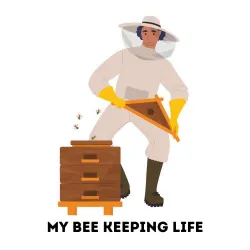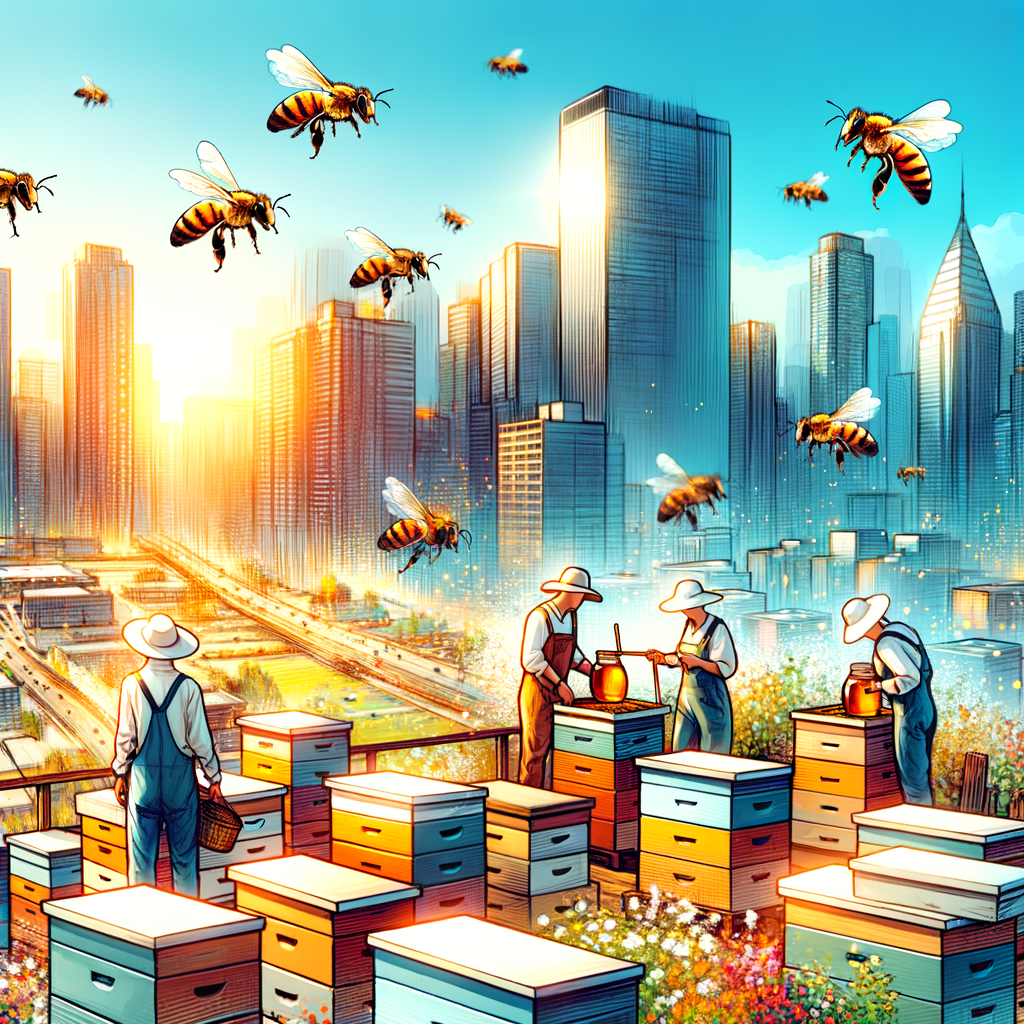
Introduction to Beekeeping for Beginners
Welcome to the fascinating world of beekeeping! This introductory guide is designed to help beginners understand the basics of beekeeping, the importance of beekeeping education, and the steps to start honey bee farming. Let’s dive in!
- Understanding the Basics of Beekeeping
Beekeeping, also known as apiculture, is the practice of maintaining bee colonies in man-made hives. This ancient practice dates back to at least 15,000 years ago. The most common type of bee kept by beekeepers is the Western honey bee, which produces honey and beeswax. Beekeeping also plays a crucial role in pollinating our crops and plants.
As a beginner, you’ll need to learn about the different types of bees, their life cycle, and their roles within the hive. You’ll also need to understand how to manage and care for your hive throughout the year, including feeding the bees, preventing diseases, and harvesting honey.
- Importance of Beekeeping Education
Education is key to successful beekeeping. Without proper knowledge and training, you may encounter challenges that could harm your bees or reduce your honey yield. By learning about bee biology, hive management, and disease prevention, you can ensure a healthy and productive hive.
Moreover, beekeeping education can also help you understand the environmental impact of your practices. Bees are vital pollinators, and sustainable beekeeping can contribute to biodiversity and ecosystem health.
- Steps to Start Honey Bee Farming
Starting a honey bee farm can be a rewarding endeavor. Here are the basic steps to get you started:
- Education: Start by learning about bees and beekeeping. Consider taking a course or reading a beekeeping book.
- Planning: Decide where to place your hives, how many hives to start with, and what type of bees to keep.
- Equipment: Purchase the necessary equipment, including a hive, bee suit, smoker, and hive tool.
- Bees: Obtain your bees, either by purchasing a package or nucleus, catching a swarm, or buying an established hive.
- Management: Regularly inspect your hive, feed your bees, manage pests and diseases, and harvest your honey.
Keep in mind, beekeeping requires patience and commitment. But with time and effort, you can enjoy the sweet rewards of your own honey harvest and contribute to the health of our planet.
Beekeeping Training Programs
For those who are serious about beekeeping, professional training programs are a must. These programs offer in-depth knowledge and hands-on experience that can help you become a successful beekeeper.
Professional Beekeeping Courses
Professional beekeeping courses are designed to provide comprehensive training in the art and science of beekeeping. They cover a wide range of topics, from the basics of beekeeping to advanced techniques and case studies of successful beekeepers.
-
- Introduction to Professional Beekeeping
This course is designed for beginners who are interested in becoming professional beekeepers. It covers the basics of beekeeping, including the biology of bees, the equipment needed for beekeeping, and the role of a beekeeper. The course also introduces students to the different types of bees and the various methods of beekeeping.
-
- Advanced Techniques in Beekeeping
For those who have mastered the basics, this course delves into more advanced techniques. It covers topics such as queen rearing, disease control, and honey production. The course also teaches students how to manage a large-scale apiary and how to deal with common challenges in beekeeping.
-
- Case Studies of Successful Professional Beekeepers
This course offers a unique opportunity to learn from the experiences of successful professional beekeepers. It includes case studies that highlight the strategies and techniques used by these beekeepers to build and manage their apiaries. The course also provides insights into the business side of beekeeping, including marketing and selling honey and other bee products.
These courses are designed to equip students with the knowledge and skills they need to become successful professional beekeepers. They offer a mix of theoretical knowledge and practical experience, ensuring that students are well-prepared for the challenges and rewards of beekeeping.
Beekeeping Certification
Getting certified in beekeeping can open up a world of opportunities. Let’s explore the benefits of getting a beekeeping certification, the top institutions that offer these certifications, and the process of obtaining one.
-
- Benefits of getting a beekeeping certification
Having a beekeeping certification can be a game-changer. It not only validates your skills and knowledge in beekeeping but also boosts your credibility. With a certification, you can confidently start your own beekeeping business or apply for jobs in the field. Plus, it’s a great way to connect with a community of like-minded individuals who share your passion for bees.
-
- Top institutions offering beekeeping certification
There are several reputable institutions that offer beekeeping certifications. Some of the top ones include the American Beekeeping Federation, the British Beekeepers Association, and the Australian Honey Bee Industry Council. These institutions provide comprehensive training programs that cover everything from bee biology and hive management to honey harvesting and disease prevention.
-
- Process of obtaining a beekeeping certification
Obtaining a beekeeping certification typically involves completing a training program and passing an exam. The training program usually consists of both classroom instruction and hands-on experience in an apiary. After completing the program, you’ll need to pass an exam that tests your knowledge and skills in beekeeping. Once you pass the exam, you’ll receive your certification and be ready to embark on your beekeeping journey.
Lastly, a beekeeping certification is a valuable asset for anyone interested in this field. It not only enhances your knowledge and skills but also opens up new opportunities. So, if you’re passionate about bees and want to take your hobby to the next level, consider getting certified.
Beekeeping Classes Online
For those who are interested in the fascinating world of bees and honey production, online beekeeping classes offer a convenient and flexible way to learn. These classes allow you to gain knowledge and skills at your own pace, from the comfort of your home.
Learn Beekeeping at Your Own Pace
Online beekeeping classes are designed to accommodate your schedule. You can learn whenever and wherever you want, making it easier to balance your beekeeping education with other commitments.
-
- Advantages of Online Beekeeping Classes
Online beekeeping classes offer several advantages. First, they provide flexibility. You can learn at your own pace and on your own schedule. Second, they offer a wide range of topics, from the basics of bee biology to advanced techniques for honey production. Third, they often include interactive elements, such as forums and quizzes, that can enhance your learning experience. Lastly, they are usually more affordable than in-person classes.
-
- How to Choose the Right Online Beekeeping Class
Choosing the right online beekeeping class depends on your goals, experience level, and budget. Here are some tips to help you make the right choice:
-
-
- Check the course content to ensure it covers the topics you are interested in.
- Consider the course format. Do you prefer video lectures, reading materials, or a combination of both?
- Look at the course duration and flexibility. Can you learn at your own pace?
- Consider the cost. While some online classes are free, others may require a fee.
- Key Takeaways from Online Beekeeping Classes
-
Online beekeeping classes can provide you with a wealth of knowledge and skills. Here are some key takeaways:
-
- Understanding of bee biology and behavior
- Knowledge of beekeeping equipment and how to use it
- Skills for managing a hive and keeping bees healthy
- Techniques for harvesting and processing honey
- Insights into the challenges and rewards of beekeeping
Apiary Courses
Apiary courses are a crucial stepping stone for anyone interested in beekeeping. They provide a deep understanding of the concept of an apiary, essential skills, and practical exercises. Let’s delve into these aspects in more detail.
-
- Understanding the concept of an apiary
An apiary, also known as a bee yard, is a place where beehives are kept. It’s a beekeeper’s playground, where they manage colonies of bees to produce honey and other bee products. Apiary courses help you understand the importance of an apiary, its setup, and maintenance. They teach you about the different types of hives, their placement, and how to create an environment conducive to bee health and honey production.
-
- Essential skills learned in apiary courses
Apiary courses equip you with essential skills to become a successful beekeeper. These include:
| Skill | Description |
|---|---|
| Bee Behavior Understanding | Learn to understand and interpret bee behavior, which is crucial in managing them effectively. |
| Hive Management | Acquire skills in managing the hive, including inspecting, cleaning, and maintaining it. |
| Honey Harvesting | Learn the best practices in honey harvesting to ensure maximum yield and quality. |
| Disease Management | Understand common bee diseases and pests, and learn how to prevent and treat them. |
-
- Examples of practical exercises in apiary courses
Practical exercises form a significant part of apiary courses. They include:
-
- Setting up and maintaining an apiary: This hands-on exercise allows you to set up an apiary from scratch and learn how to maintain it.
- Inspecting a hive: You’ll learn how to open a hive, identify the queen, worker bees, and drones, and check for signs of disease or pests.
- Harvesting honey: This exercise teaches you how to harvest honey without harming the bees or damaging the hive.
- Treating diseases and pests: You’ll learn how to identify and treat common bee diseases and pests, a crucial skill for any beekeeper.
Apiary courses are a treasure trove of knowledge and practical skills for aspiring beekeepers. They offer a comprehensive understanding of the concept of an apiary, essential beekeeping skills, and hands-on exercises that prepare you for real-world beekeeping.
Beekeeping Course Reviews
Choosing the right beekeeping course can be a daunting task, especially with the numerous options available. One effective way to make an informed decision is by considering course reviews. Let’s dig deeper into why course reviews are essential, how to interpret them, and some case studies of top-rated beekeeping courses.
Choosing the Right Course for You
-
- Importance of Course Reviews in Selecting a Beekeeping Course
Course reviews provide firsthand information about the experiences of those who have taken the course before. They offer insights into the course content, the instructors’ teaching methods, and the practical skills gained. Reviews can help you understand if the course meets your expectations and if it’s worth your time and money.
-
- How to Interpret Beekeeping Course Reviews
When reading course reviews, it’s crucial to look beyond the star ratings. Consider the reasons behind the reviewers’ ratings. Are they happy with the course content? Did they find the instructors knowledgeable and helpful? Did the course help them in their beekeeping journey? Look for patterns in the reviews. If many people praise or criticize the same aspects, it’s likely a valid point.
-
- Case Studies of Top-Rated Beekeeping Courses
Let’s look at a few examples of top-rated beekeeping courses:
| Course Name | Rating | Key Strengths |
|---|---|---|
| Beekeeping for Beginners | 4.8/5 | Comprehensive content, excellent for beginners, knowledgeable instructors |
| Advanced Beekeeping Techniques | 4.7/5 | Great for experienced beekeepers, hands-on learning, advanced techniques |
| Online Beekeeping Course | 4.5/5 | Convenient online format, interactive sessions, covers both basic and advanced topics |
These courses have received high ratings for their comprehensive content, knowledgeable instructors, and practical learning opportunities. However, remember that the best course for you depends on your personal needs and goals in beekeeping.







